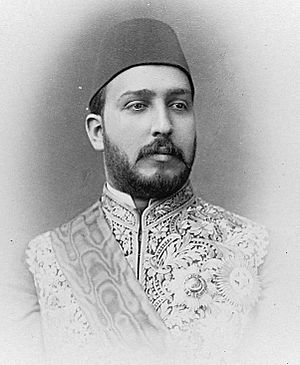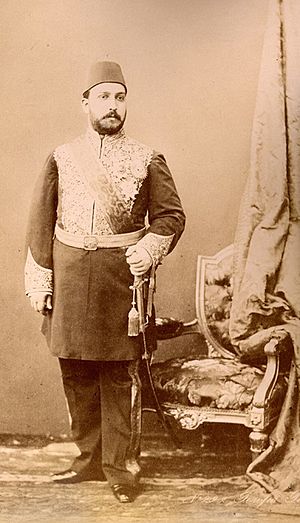Tewfik Pasha facts for kids
Quick facts for kids Mohamad Tewfik |
|
|---|---|
| Pasha | |

Tewfik Pasha, c. 1882
|
|
| Khedive of Egypt and Sudan | |
| Reign | 26 June 1879 – 7 January 1892 |
| Predecessor | Isma'il I |
| Successor | Abbas Helmy II |
| Born | 15 November 1852 Cairo, Egypt Eyalet, Ottoman Empire |
| Died | 7 January 1892 (aged 39) Helwan, Khedivate of Egypt, Ottoman Empire |
| Burial | Qubbat Afandina, Cairo, Egypt |
| Spouse | Emina Ilhamy |
| Issue | Abbas Helmy II of Egypt Mohammed Ali Tewfik Princess Nazli Hanim Princess Fakhr un-nisa Khadija Hanim Princess Nimatullah Hanim |
| House | Alawiyya |
| Father | Isma'il I |
| Mother | Shafaq Nur Hanim |
Mohamed Tewfik Pasha (Arabic: محمد توفيق باشا Muḥammad Tawfīq Bāshā; born in 1852, died in 1892), also known as Tawfiq of Egypt, was the ruler of Egypt and Sudan. He was called the khedive and ruled from 1879 to 1892. He was the sixth leader from the Muhammad Ali Dynasty.
When Tewfik became khedive, Egypt was facing many money and political problems. These issues were left over from his father's rule. There was also unhappiness in the Egyptian army. Britain and France started to control Egypt's money in the 1880s. This led to a rebellion against foreign influence, known as the Urabi revolt. Tewfik was also interested in improving things like farming, schools, and the justice system. He made changes to the royal palace, closing the special women's quarters (harem) and promoting one wife for himself.
Contents
Early Life and Education
Tewfik was the oldest son of Khedive Isma'il. He was born on April 30 or November 15, 1852. His mother was Princess Shafaq Nur Hanim. Unlike his younger brothers, he did not go to Europe for school. He grew up and was educated in Egypt.
He learned to speak French and English very well.
Becoming Heir to the Throne
In 1866, his father Isma'il changed the rules for who would become khedive next. Before, the title went to the youngest male relative of Muhammad Ali. Now, it would pass from father to son. Isma'il wanted this change because he did not like his uncle, who was supposed to be next in line.
However, after the change, powerful countries like Britain and Germany said the rule meant the title must go to the eldest son. So, Tewfik became the official heir. He was given a palace near Cairo and lived a quiet life for 12 years. He spent his time farming and became known for being fair and sensible with his neighbors.
Marriage and Family Life
On January 15, 1873, Tewfik married Princess Emina Ilhamy in Cairo. She was born in 1858 and passed away in 1931. She was the daughter of Prince Ibrahim al-Hami.
Tewfik and Emina were very happy together. She was his only wife, and Tewfik strongly believed in having only one wife (monogamy). When he became khedive, he closed the special women's living areas (harem) in the royal palace.
Tewfik's Children
Tewfik and Emina had five children:
- Abbas Hilmi II Pasha, who became the next Khedive of Egypt.
- Prince Mohammed Ali Tewfik.
- Princess Nazli Hanim.
- Princess Fakhr un-nisa Khadija Hanim.
- Princess Nimatullah Hanim.
Early Role in Government
In 1878, Tewfik was made the head of the government council. This happened after the previous head, Nubar Pasha, was removed. Tewfik held this job for only a few months. But during this time, he showed that he was wise. He stayed out of the secret plans and arguments that were common in Egyptian and Sudanese politics back then.
After this, he returned to his estate and went back to his quiet country life. But this peace did not last long.
Becoming Khedive
On June 26, 1879, his father Isma'il was removed from power. This happened because Britain and France insisted on it. The Ottoman Sultan Abdul Hamid II then ordered that Tewfik should be made the new Khedive.
Tewfik was not happy to hear this news. He was so surprised that he even playfully hit the servant who told him.
Tewfik's Time as Ruler (1879-1892)
When Tewfik became khedive, Egypt and Sudan were in a lot of trouble. His father's choices had caused many money and political problems. The situation got worse because Britain and France did not act for several months after Tewfik took over.
The people of Egypt were unhappy, and the army was rebellious. Tewfik's advisors were often people who only cared about themselves. Tewfik himself was not a strong leader and did not have much experience. This made it hard for him to manage the country well.
British and French Influence
Things remained messy until November 1879. At that time, Britain and France again took control of Egypt's money. For more than two years, British and French officials like Evelyn Baring (later Lord Cromer) basically ran the country. They tried to make improvements, but they did not have the power to force changes.
During this time, the Egyptian army became more and more rebellious. Some people blamed Tewfik for not being tougher with the rebels. But his actions were limited by his relationship with Britain and France. He could not fully control what was happening.
The Urabi Revolt
The unhappiness in the army led to a movement against foreign influence. This movement was led by Urabi Pasha, who gained full control of the army. In July 1882, Urabi started building defenses around Alexandria. This made the British admiral, Sir Beauchamp Seymour, say he would attack the forts of Alexandria if they were not given to him.
Before the attack started, Tewfik was advised to leave the city. He could go on a warship from another country, his own yacht, or a mail ship. But he bravely replied, "I am still Khedive, and I will stay with my people in their time of danger."
He was at his palace, Qasr el-Raml, which was a few miles from the city. It was out of reach of the shells. But his life was still in danger. When rebel soldiers attacked the palace, he managed to escape. He reached another palace by going through the burning streets of Alexandria. There, he had to agree to have British sailors protect him.
He showed his courage again during a serious illness outbreak (cholera) in Alexandria in 1883. He had returned to Cairo after the Battle of Tel al-Kebir. He had agreed to the changes that Britain wanted. He took on the role of a ruler who followed a constitution, guided by Lord Dufferin, a British special official.
When the illness spread, Tewfik insisted on going to Alexandria. His wife went with him. He visited hospitals, setting a great example for the city's leaders. He also encouraged the sick people with kind and hopeful words.
Working with British Advisors
In 1884, Sir Evelyn Baring (Lord Cromer) returned to Egypt as the main British representative. His first job was to ask Tewfik to give up control of Turco-Egyptian Sudan. Tewfik agreed, though he did not want to. But once he agreed, he did everything he could to help Baring's plan succeed.
He also acted correctly during talks between Sir H. Drummond Wolff and the Turkish representative, Mukhtar Pasha, in 1886. Tewfik's position was not easy. He was a ruler who had to watch while others discussed and managed his country's affairs. The Sultan was his higher ruler, and Britain was his protector. He tried to be friendly and respectful to both.
Over time, Tewfik trusted Baring more and more. Eventually, he would agree with the British agent on almost everything. However, sometimes he made his own decisions. For example, in June 1888, he removed Nubar Pasha and asked Riaz Pasha to form a new government. This decision was also influenced by Tewfik knowing that Nubar and the British agent disagreed.
Baring encouraged Tewfik to be active in managing the country. Tewfik took a great interest in improving farming (irrigation), schools (education), and the justice system. He was not a very grand person, but he truly wanted to rule his country for its own good. He understood how important British help and support were for Egypt. His natural cleverness made him accept the British conditions. His good nature kept him from getting involved in secret plots.
Death
Mohamed Tewfik Pasha passed away on January 7, 1892. He died at the Helwan Palace, near Cairo. His oldest son, Abbas II, became the next khedive.
Honors and Awards
Tewfik Pasha received many awards from different countries:
 Knight of the Order of the Iron Crown, 1st Class, 1868
Knight of the Order of the Iron Crown, 1st Class, 1868 Order of Honour, Imtiyaz Medal, 1868
Order of Honour, Imtiyaz Medal, 1868 Order of the Osmans, Nishan-i-Osmania, 1868
Order of the Osmans, Nishan-i-Osmania, 1868 Order of Nobility, 1868
Order of Nobility, 1868 Commander Grand Cross of the Order of Vasa, 17 December 1868
Commander Grand Cross of the Order of Vasa, 17 December 1868 Grand Cross of the Order of the Red Eagle, 29 January 1870
Grand Cross of the Order of the Red Eagle, 29 January 1870 Grand Cross of the House and Merit Order of Peter Frederick Louis, 5 February 1875
Grand Cross of the House and Merit Order of Peter Frederick Louis, 5 February 1875 Honorary Grand Commander of the Order of the Star of India, 3 May 1875
Honorary Grand Commander of the Order of the Star of India, 3 May 1875 Grand Cross of the Royal Order of Kalākaua I, 1881
Grand Cross of the Royal Order of Kalākaua I, 1881 Grand Cross of the Order of Saints Maurice and Lazarus, 1886
Grand Cross of the Order of Saints Maurice and Lazarus, 1886 Grand Cross of the Order of Franz Joseph, 1886
Grand Cross of the Order of Franz Joseph, 1886 Honorary Grand Cross of the Order of the Bath (civil division), 21 June 1887
Honorary Grand Cross of the Order of the Bath (civil division), 21 June 1887 Grand Cross of the Order of the Netherlands Lion, 1890
Grand Cross of the Order of the Netherlands Lion, 1890 Grand Cross of the Légion d'honneur, 1890
Grand Cross of the Légion d'honneur, 1890 Knight of the Order of the Seraphim, 18 April 1891
Knight of the Order of the Seraphim, 18 April 1891
Images for kids
 | Selma Burke |
 | Pauline Powell Burns |
 | Frederick J. Brown |
 | Robert Blackburn |



